
views
Assembling Your Team

Form a group of up to 8 people. Call up your squad and hit the bar, or search for a friendly-looking group to join up with if you're out by yourself. Some trivia outfits dictate that teams have to include a certain number of players, while others will let you play with as few or as many people as you like. Be sure to follow the rules laid out by the company that’s hosting the game. There’s no need to set your standards too high when it comes to who you allow on your team. The point is just to have a good time testing your collective wits. You may not be permitted to have more than 6-7 players on your team if you’re taking part in a tournament, fundraiser, or other special event.

Come up with a unique team name. You can call your team anything you want, so don’t be afraid to get creative, clever, or downright quirky. If you’re having trouble thinking of something fitting, consider the things that you all have in common, like a favorite activity, interest, or inside joke. If you’re out with a few of your classmates from your chemistry program, for example, you might call yourselves “The Noble Gases.” Make sure everyone in your group is happy with your team name, as you may be stuck with it for future games if you emerge victorious. Steer clear of names that might be deemed lewd or offensive to other bar patrons. Live trivia should be good clean fun.Tip: Playful puns like “The Q and A-holes” and “Quizzy Gillespie” tend to be a big hit with die hard trivia fans.

Gather your team together at one table or spot along the bar. Everyone on your team needs to be in one central location while the game is in progress. Sticking together will not only help your host keep up with who’s on what team but also put you in a better position to huddle up and discuss possible answers. Don’t feel like you have to stay glued to your seat the entire time. It’s perfectly alright to make a trip to the restroom or jet back to the bar for another round. Avoid hanging around too close to the other teams’ tables. They (or your watchful host) may think you’re a spy sent to steal answers.
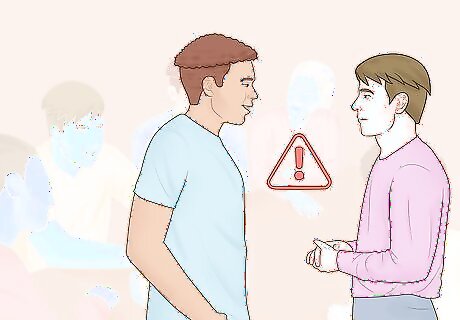
Limit outside socializing once the game is underway. Anyone who wanders over to your table might be counted as part of your team, even if they’re not participating. Accidentally exceeding the legal player limit could be grounds for disqualification in more competitive games. If you happen to receive visitors after the game has started, let them know that you’re involved in a fiercely competitive game of trivia and that they’re welcome to join you (as long as it won't put you over the specified number of players).
Learning the Rules
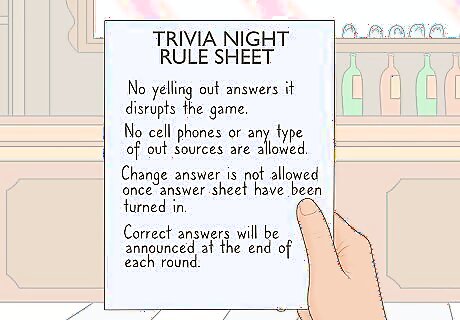
Look over the rule sheet you’re provided before the fun starts. It will lay out the specific guidelines used by the company hosting the game so you’ll know exactly how things are going to go down. Your master of ceremonies, or "quizmaster," will also typically go over the rules prior to the start of the game to clear up any potential confusion. Feel free to ask questions or request clarification about any rules you don’t understand.

Put away your phones for the duration of the game. The number one rule of live trivia is no phones. Before your host opens the first round of questions, they’ll instruct everyone participating to turn off their devices or stash them somewhere out of sight. Make sure they stay stashed until the very last answers have been submitted. This also applies to devices like laptops, tablets, smart watches, and Bluetooth headsets, as well as books and other outside reference materials. Don’t try to get cute, or you could end up ruining the experience for your whole team. Remember the old saying, “Cheaters never prosper.” Secretly attempting to look up answers isn’t just dishonest and unfair, it also robs the game of what makes it enjoyable in the first place.Warning: Your team could be at risk of penalty or disqualification if one of your phones is even spotted out on the tabletop.
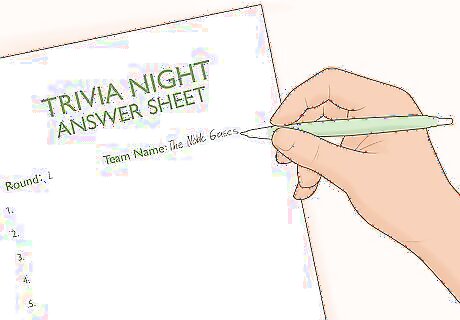
Write down your team name on the top portion of your answer sheet. In most cases, the answer sheet will provide a single blank where your team’s name will go. More rarely, it may ask for the individual names of everyone on your team. If you don’t specify your team name, you won’t receive points for the questions you manage to answer correctly.

Be prepared to tackle a wide variety of questions. Live trivia questions can cover anything from world history to Harry Potter. They can also come in a variety of formats. While many game-runners stick with basic fill-in-the-blank and multiple-choice questions, others make use of true-false, ordering, and even image- or music-based conundrums to keep players guessing. Listen carefully. Even though your quizmaster will be reading the questions out over a loudspeaker and will usually repeat themselves at least once, it can still be tough to hear over blaring music, shouting voices, and other noise characteristic of crowded bars. The questions will start off fairly easy and get progressively harder as you go along.
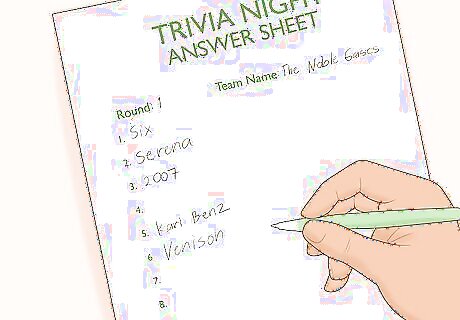
Record your team’s answers for each question as it’s asked. Print your answers clearly, and double-check that each one is in the appropriate blank for the question you’re on. You’ll usually only have 1-2 minutes to discuss and agree on your answers, so think fast. Put one person on your team in charge of writing down your answers. That way, everyone won’t be fighting over the same pen or feeling reluctant to take on the role because they’re expecting someone else to do it. Make sure all of your teammates are on board with your answer before the answer period comes to an end. Once you’ve locked in an answer, you won’t be able to change it. Refrain from shouting out your answers. It will just spoil the fun for everyone!

Designate one teammate to turn in your answer sheet at the end of each round. This person will be your team’s “runner.” They’ll be responsible for hand-delivering your answers to the quizmaster after you’ve completed a certain number of questions. The quizmaster will then review them and tally up your points based on your number of correct responses. It may not be necessary for the same player to serve as your team’s runner every time. Just check with your host or judges before you switch things up. Some trivia hosts prefer to collect the answer sheets themselves. When this is the case, all you have to do is leave your answers out on the table or bar top and wait for your host to come around and pick it up, A single round typically consists of 10-15 questions. When a round is over, your quizmaster will announce each individual team’s score so you’ll have an idea of how well you’re doing.
Improving Your Score

Make the brainstorming process a group effort. Don’t just rely on the same one or two players to do all the intellectual heavy-lifting—get the whole team involved. Everyone has a different assortment of facts, figures, and random information pinging around in their heads. In order to pick up the “W,” you’ll need to utilize your collective strength. This is a prime opportunity to find out who among your friends possesses a deeper-than-average knowledge of a particular subject or field. Sometimes when no one person on your team knows the answer to a given question, talking it over can help you arrive at a consensus.Tip: To make things more equal and efficient, you might even assign each player a specialty so you’ll know who to turn to when you start getting hit with more difficult questions.
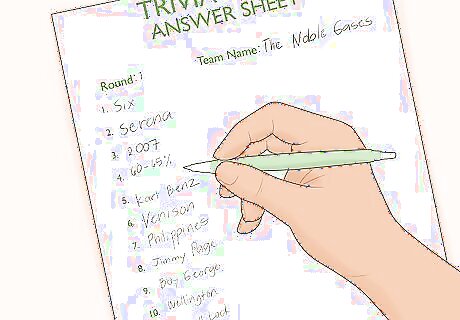
Do your best to provide an answer for every question. If everyone on your team is coming up empty, make it a point to write something down before your time limit expires. You at least have a shot at earning some points by throwing out your best guess. If you leave a question blank, however, you’re guaranteed to get it wrong. Try to recall anything and everything you know about the topic at hand. If your team finds itself stumped by a question like, “Who was the star of the famous western Pale Rider?”, putting down “John Wayne” is better than putting down nothing. With a little luck, you might even give the right answer by pure happenstance.

Listen for hints in the way questions are posed. If you notice your quizmaster phrasing something strangely or emphasizing key words or sounds, they could be offering a clue. Stay alert so you’ll be able to pick up on these sorts of subtle tips if and when they present themselves. They’re guaranteed to be a huge help, especially in the more challenging later rounds. A question with the structure, “This rock icon shook, rattled, and rolled his way to the top of the charts in the summer of ‘54,” for instance, would be steering you towards the answer, “Bill Haley & His Comets.”

Talk to your host if you have a dispute with one of their answers. Every so often, you may believe that your quizmaster has unknowingly gotten an answer wrong. And it’s possible—nobody’s perfect. When this happens, wait until the end of the answer period, then approach the quizmaster one-on-one and inform them of the suspected mistake quietly. Chances are, they’ll appreciate your vigilance and be glad to address any concerns you may have. Piping up about dubious answers could result in your team being awarded points that might have otherwise passed you by. Avoid insulting your quizmaster or make pointed accusations of unfairness. In addition to being just plain rude, this sort of behavior could result in your team being banned from future games or even get you kicked out.


















Comments
0 comment